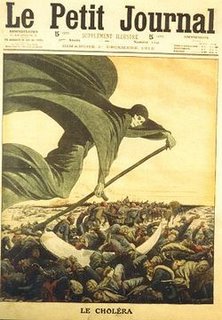Cholera or not....

Categories: s1 and s2, Glaciation, Rivers, Development and Health
I wanted to put some of the s2 movies onto the student blog tonight, something I'm still going to have a go at, but having problems with my yahoo mail account, getting some mail two days late from my school account. As a result, will probably only get two or three done. We are doing an earthquake linking activity just now, but are just about ready to start volcanoes. After the feedback on our prehistoric videos, I'll try to use Ian Stewart's 'Journeys into the Ring of Fire', showing some up to date footage of Merapi erupting. The point was made in an excellent video from one of the boys about volcanoes impact on world climate, something which surprised many of the class, and I'm sure that this is discussed here. As an aside, could you let me know if you can see the survey results in the previous post, I am having a few difficulties?
Really want to use the weather station tomorrow, but may have to build an ark to get to it! It would be an excellent time for s1 to start their weather investigation, our wettest winter for 30 years. We will also work with weather words tomorrow.
s3 gave some excellent feedback on the Physical Environments Unit, and the subsequent review session that we held highlighted a real concern about glaciation, coincidentally covered through textbook when I was in France with last year's s3 studying a glaciated landscape...My apologies, I should have spent more time going over the work. I want to use a Glaciation Mission Impossible from the Radical Geography site as another insight into your problems with this part of the course. I will give out some sheets to be handed back, and a very quick sketching exercise will follow. Clear diagrams are the key to this part of the course. We will probably flit back to looking at Rivers, this time on the map to finish the skills part of the unit.
s4 basically have the AIDS work from last day to complete, as we spent virtually the whole period talking about the survey, which in itself really helped put a perspective on areas of strength and areas for development. I tried something with Higher today to talk about the spread of disease and used AIDS as an example. Without telling what we were doing, at five points I stopped the class and asked them to write the names of 11 people they knew in one minute. By the time we got to the fifth stop, lots of people were struggling (teachers names started going on the page). At the break in the period, people asked what we had been doing. I told them that the five minutes that it took us to write down all the names is exactly the same time that it takes for AIDS to claim 55 victims (saw an AIDS clock somewhere a while back which suggested 11 people a minute die from the disease, although some sources vary). I may do something similar tomorrow with s4.
As for s5, we started a 'cholera or not' exercise which has to be completed. Pictures of cooked prawns, orange peel, hand pumps, shanty towns,surf, kettles etc and pupils asked to speculate on link, if any to cholera. I forgot to cover the ill health vicious circle, so will revisit this, and then maybe a little about how cholera spreads. A worksheet will follow, and then maybe some kind of distinction between water washed, water based, water borne diseases etc. I should also point out that we had discussed pandemics, epidemics and endemic diseases, and had shown this on various overlays on GE, before talking about a number of different diseases, many with links to water. Good links on the BBC for disease, see the link above to start navigating.




0 Comments:
Post a Comment
<< Home